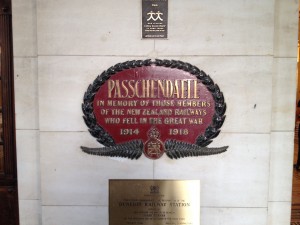Armistice Day
Yesterday was Veterans Day in the United States. But, in Great Britain, Canada, most of the Commonwealth countries, and several European nations, it’s known by an older name – Armistice Day. And originally it commemorated the end of World War I at 11:00 AM on November 11, 1918.
Veterans Day is taken seriously in the US, of course. But it’s hard for Americans to grasp how much more seriously Armistice Day is regarded, especially in those countries that formed part of the British Empire. I spent the years between my eighth and tenth birthdays near London, attending the local primary school. And one of my most vivid memories is of being driven, with a schoolmate, by his father on November 11. When the church bells rang out at 11:00 AM, my friend’s father pulled over, turned off the car, and told us to be quiet for two minutes. And we were – along with the tens of millions of others living in England, and Canada, and Australia, and New Zealand. Everything just stopped.
Looking back at the casualty figures for World War I, it’s not hard to figure out why that long-ago war still figures so strongly in the current memory of so many countries. Australia and New Zealand lost around 1% each of their people serving in the military; a figure equivalent to 3 million Americans today. The United Kingdom lost around 2%. If you remember that all of these casualties were young men, it’s just possible to imagine the devastation such losses caused to entire nations.
And the losses for other combatants were even higher. France lost over 4% ( equivalent to 12 million Americans), Italy around 3%, the Austria-Hungary around 4%, and Germany over 4%. When civilian casualties were figured in, the figures were even worse. Turkey lost around 5%, Romania over 8%, and Serbia a cataclysmic minimum of 11%, although some estimates put it at almost 20% (60 million Americans).
Why go on at such length about a war that ended exactly 100 years ago yesterday? Because 100 years ago in our business is still the present. The list of composers and performers who fought and risked their lives in World War I is full of names we encounter at work every day. Ralph Vaughan Williams, Arthur Bliss, Maurice Ravel, Carl Orff, Fritz Kreisler, Arnold Schönberg, and Alban Berg were among those who survived. And there were those who didn’t, including the English composers George Butterworth and the German composer Rudi Stephan.
But of course it is impossible to know what potential was lost. I’ve come to learn in writing Polyphonic’s annual remembrance of past colleagues just how many of them served in World War II. I’m sure that, 50 years ago, the same was true of service in what was then known as “the Great War.” Who we can’t remember, of course, are those who died before they fulfilled their potential as performers or composers or teachers. But, with over 16 million dead, the vast majority of whom were young, we know there were many, many potential colleagues and mentors who our field lost in the early 20th century. We can only imagine what effect their lives might have had on our field then and today. Imagine our profession without Vaughan Williams or Maurice Ravel or Alban Berg or Fritz Kreisler, and you begin to get an idea.
This is a picture I took this summer in Dunedin, New Zealand at the train station. It commemorates the dead of Passchendaele, just one of the charnel house battlefields of the Western Front. There are plaques like it all over the United Kingdom and the countries of the British Commonwealth. It helps them to remember what we all should – that modern war, regardless how just, is unspeakably evil and destructive. We’re all entitled to hope that there will be no need for more such memorials.


No comments yet.
Add your comment